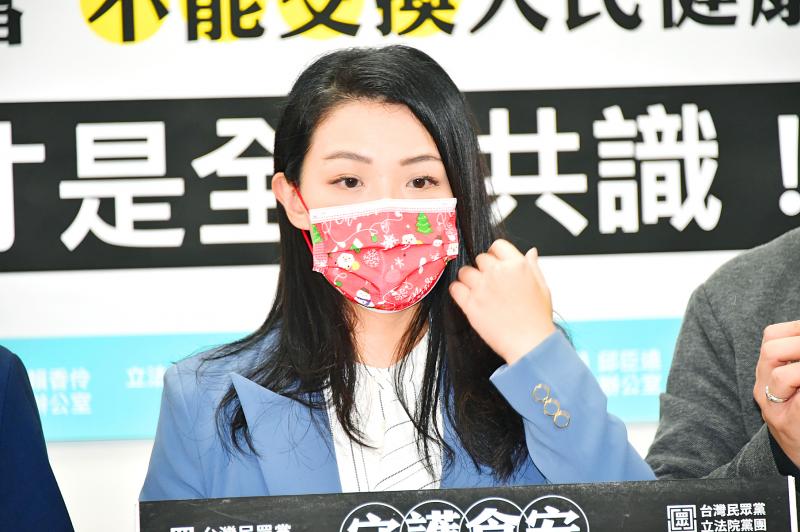The government should evaluate the standards for obtaining personal data for COVID-19 prevention after the pandemic ends to allay privacy concerns, Taiwan People’s Party Legislator Ann Kao (高虹安) said yesterday.
Kao made the remark during an interview with radio host Clara Chou (周玉蔻) in response to public concerns about the Central Epidemic Command Center’s (CECC) “electronic fence 2.0” system that was launched last week.
The system is intended to detect people who attend major public events while under self-health management orders.

Photo: Tu Chien-jung, Taipei Times
The CECC on Dec. 22 announced that people under self-health management are banned from large events, and Minister of Health and Welfare Chen Shih-chung (陳時中), who heads the center, said the system would be used to find people who contravene those rules.
More than 30 people under self-health management were detected near the Taipei City Government’s New Year’s Eve event, and seven people under self-health management were asked to leave concerts by rock band Mayday in Taoyuan on Thursday and Friday evening.
After public concerns were raised about the system, the CECC on Saturday said that it is only used to detect people under home isolation, home quarantine or self-health management.
Kao, a former vice president of Hon Hai Technology Group’s Industrial Big Data Office, said that similar technology has already been used to control the spread of COVID-19.
She cited the monitoring of cellphone signals picked up by base stations to track the movements of passengers from the Diamond Princess cruise ship early last year.
The CECC used that information to issue text message warnings to people whose mobile devices were detected in the areas where the passengers had been, she said.
Kao said that legislators had debated the legality of the use of such technology when reviewing the Special Act on COVID-19 Prevention, Relief and Restoration (嚴重特殊傳染性肺炎防治及紓困振興特別條例).
Lawmakers at the time decided to include a clause in the act allowing the CECC to implement necessary response actions or measures for disease prevention and control, so that the center could use personal data in the interest of protecting public health, she said.
“However, once the pandemic is over, what the standard for using personal data is remains a question to be answered,” Kao said.
People would need to consider the government’s use of highly confidential data and whether the Personal Information Protection Act (個人資料保護法) and other regulations can protect them, she added.
Premier Su Tseng-chang (蘇貞昌) said that the “electronic fence 2.0” system is never used to check people’s personal data or messages, and that it is standard procedure as part of COVID-19 prevention measures to use the system to detect whether a few high-risk individuals have breached regulations.
Personal data collected as part of COVID-19 prevention efforts would be destroyed after 28 days, in line with regulations, Chen said.

Taiwanese can file complaints with the Tourism Administration to report travel agencies if their activities caused termination of a person’s citizenship, Mainland Affairs Council Minister Chiu Chui-cheng (邱垂正) said yesterday, after a podcaster highlighted a case in which a person’s citizenship was canceled for receiving a single-use Chinese passport to enter Russia. The council is aware of incidents in which people who signed up through Chinese travel agencies for tours of Russia were told they could obtain Russian visas and fast-track border clearance, Chiu told reporters on the sidelines of an event in Taipei. However, the travel agencies actually applied

Japanese footwear brand Onitsuka Tiger today issued a public apology and said it has suspended an employee amid allegations that the staff member discriminated against a Vietnamese customer at its Taipei 101 store. Posting on the social media platform Threads yesterday, a user said that an employee at the store said that “those shoes are very expensive” when her friend, who is a migrant worker from Vietnam, asked for assistance. The employee then ignored her until she asked again, to which she replied: "We don't have a size 37." The post had amassed nearly 26,000 likes and 916 comments as of this

New measures aimed at making Taiwan more attractive to foreign professionals came into effect this month, the National Development Council said yesterday. Among the changes, international students at Taiwanese universities would be able to work in Taiwan without a work permit in the two years after they graduate, explainer materials provided by the council said. In addition, foreign nationals who graduated from one of the world’s top 200 universities within the past five years can also apply for a two-year open work permit. Previously, those graduates would have needed to apply for a work permit using point-based criteria or have a Taiwanese company

The Shilin District Prosecutors’ Office yesterday indicted two Taiwanese and issued a wanted notice for Pete Liu (劉作虎), founder of Shenzhen-based smartphone manufacturer OnePlus Technology Co (萬普拉斯科技), for allegedly contravening the Act Governing Relations Between the People of the Taiwan Area and the Mainland Area (臺灣地區與大陸地區人民關係條例) by poaching 70 engineers in Taiwan. Liu allegedly traveled to Taiwan at the end of 2014 and met with a Taiwanese man surnamed Lin (林) to discuss establishing a mobile software research and development (R&D) team in Taiwan, prosecutors said. Without approval from the government, Lin, following Liu’s instructions, recruited more than 70 software